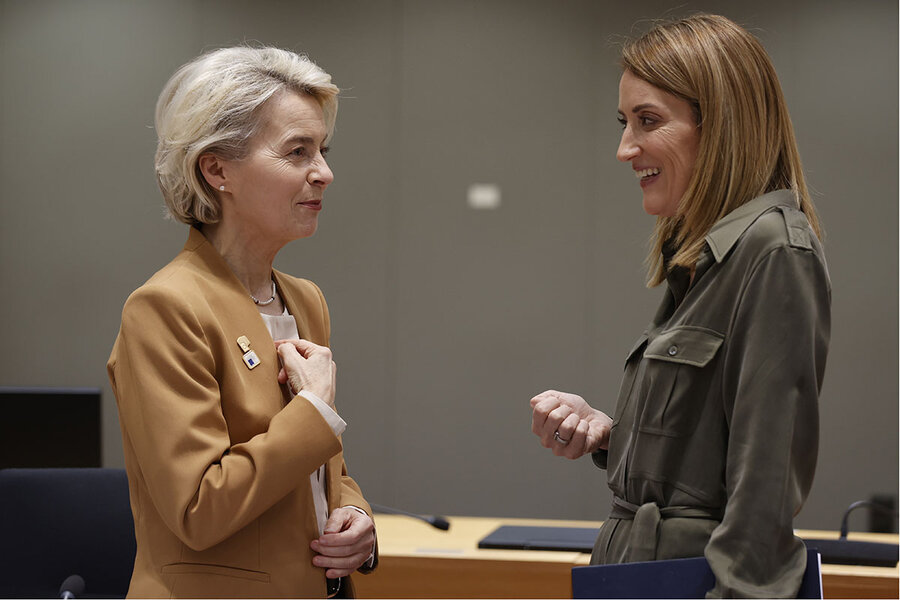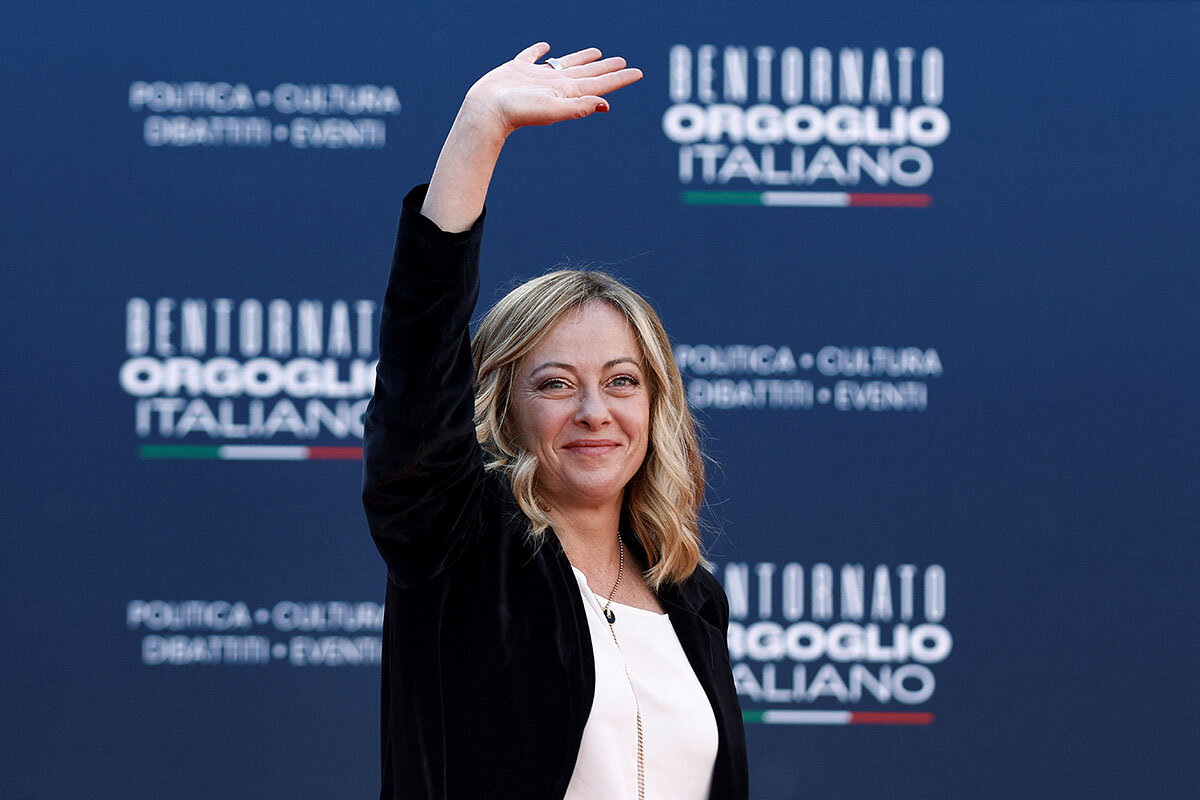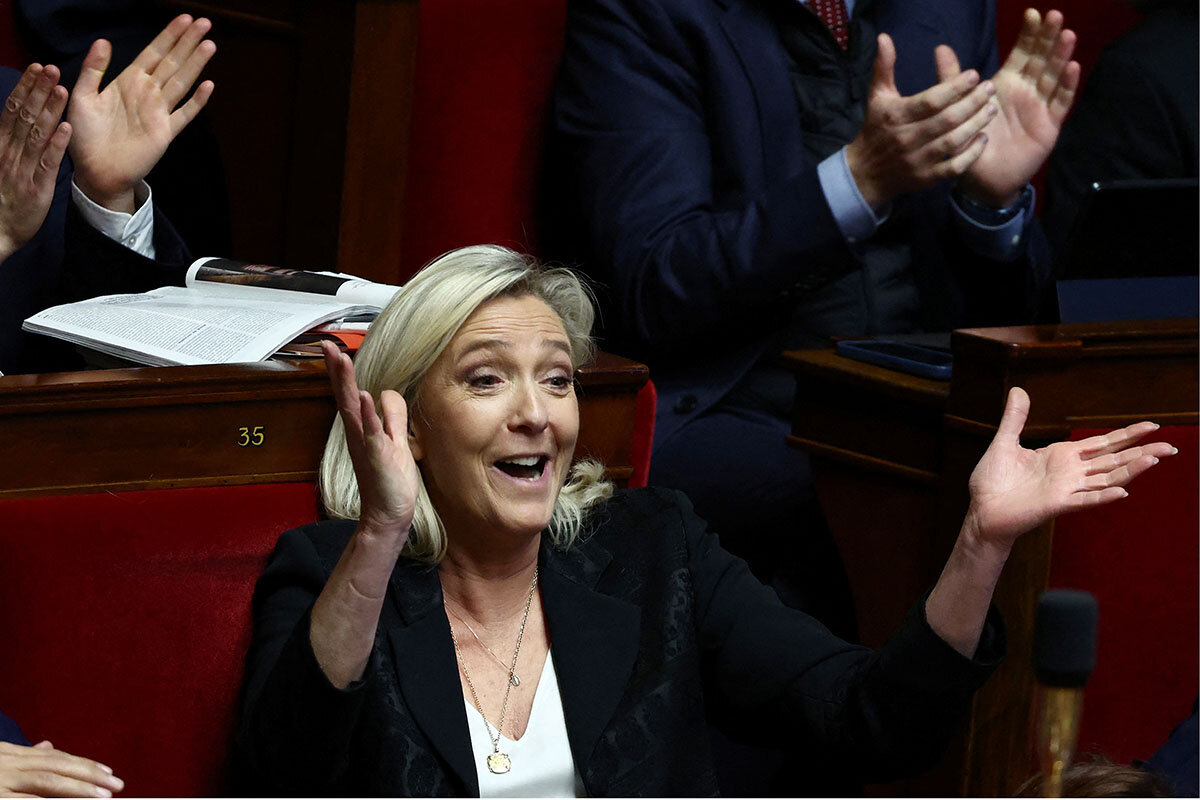Immigration debate pushes Europe toward hard right
Loading...
| London
The Eurovision contest, to tens of millions of Europeans and the far fewer Americans who are familiar with it, is an annual song competition – best known, perhaps, for having propelled a little-known Swedish pop group called ABBA to worldwide fame in the 1970s.
But a very different kind of Eurovision contest is now underway, with much higher stakes.
It is between two rival visions of Europe’s political future.
Why We Wrote This
If you can’t beat ’em, join ’em? Traditionally moderate, conservative European parties are adopting anti-immigration policies in hopes of boosting their appeal to far-right populists, whose numbers are growing.
There have been growing signs in recent days that it’s intensifying, and that the prevailing political winds are pushing Europe decidedly rightward.
At issue in this new Eurovision contest is the resilience of the principles and priorities that have long underpinned the 27-nation European Union: cooperation and consensus; broadly centrist, democratic governance; social inclusivity; and a shared commitment to human rights and the rule of law.
That’s because an alternative vision has been attracting support for far-right politicians across a range of EU countries. This vision is more inward-looking, more assertively nationalist. And it prioritizes the importance of tough, no-nonsense government action over judicial checks or minority protections.
And a main battleground, in Europe just as in America, is immigration.
Until recently, the political contest seemed finely balanced, with everything to play for ahead of next June’s five-yearly continentwide elections to the European Parliament.
Yet a host of right-wing nationalist parties had been gaining strength, even securing a role in national government in traditionally social-democratic countries like Sweden and Finland, and emerging as the main opposition force in France’s national parliament.
In Italy, Giorgia Meloni, heading a party with fascist roots, had become prime minister.
Still, in Spain over the summer, the center-left prime minister survived an election challenge propelled by a far-right nationalist party, Vox.
And in mid-October, a coalition of Polish opposition parties led by Donald Tusk – a former European Council president pledging to restore an independent judiciary and protect minority rights – unexpectedly managed to unseat a well-entrenched, increasingly autocratic government.
Meanwhile, Europe’s shared recognition of the threat posed by Russian President Vladimir Putin’s invasion of Ukraine seemed to be providing a ballast of EU-wide unity, with even Ms. Meloni and far-right French leader Marine Le Pen firmly on board.
Now, however, there are signs that the mood is changing.
One major catalyst has been the shock result in last month’s parliamentary election in the Netherlands. Emerging as the single largest party, though still well short of a majority, was the Party for Freedom, led by Geert Wilders, a veteran far-right opponent of immigration who has in the past called for the closure of mosques and a ban on the Quran.
And there are signs of a political shift as well in two of the EU’s most important member states, Germany and France, where economic grievances and an overall lack of confidence in central government have bolstered support for the populist nationalism of far-right parties.
In a sign of the times last weekend, though national elections are several years away, a candidate backed by the far-right AFD party in Germany secured its first major mayoral victory, in a city outside Dresden.
In France on Tuesday, President Emmanuel Macron significantly toughened the provisions of a new immigration bill in order to get it through the National Assembly, where his center-left party no longer commands a majority. The rewrite included a tighter limit on state support for migrants, as well as new conditions for granting residents permits.
Ms. Le Pen, who threw her National Rally party’s support behind the amended version, hailed the changes as an “ideological victory.”
On Wednesday, the EU announced a similarly toughened agreement on unionwide immigration policy, with a major emphasis on strengthening border controls and asylum procedures for migrants.
In a sign that the political Eurovision contest remains very much alive, however, there was vocal opposition to the toughened immigration policies.
It came from prominent members of Mr. Macron’s political party, other centrist and left-of-center politicians, and a range of European nongovernmental organizations, human rights groups, and legal groups all concerned with immigration.
The strategy behind the policy shifts in Paris and Brussels seem to be in line with an approach increasingly adopted in recent years by established center-right political parties around Europe: to tack rightward in the hope of boosting their appeal to far-right populists, whose numbers are growing.
One argument against such plans, however, is simply that they will not work.
Opponents point to recent electoral trends in northern Europe, where far-right, anti-immigrant parties had traditionally been on the irrelevant fringe, viewed by the mainstream conservative parties as beyond the political pale.
In moving to assume the far right’s immigration mantle, center-right parties have actually lost support, they say.
And if the recent Dutch election is any indication, when polling day comes around, many voters are indeed dubious about establishment parties that have recently adopted an overtly anti-immigrant stance.
If they are going to vote for an anti-immigrant party, those voters seem to have concluded, they might as well vote for the real thing, not a Johnny-come-lately imitation of the original.








